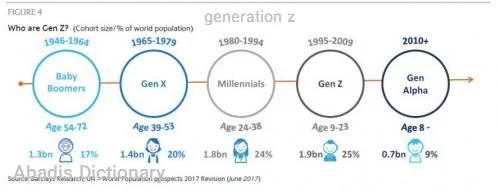نسل زد ( یا به طور خلاصه Gen Z ) ، که به زبان عامیانه به عنوان زومرها نیز شناخته می شود، گروه دموگرافیک جانشین نسل وای و قبل از نسل آلفا است. محققان و رسانه های مشهور از اواسط تا اواخر دهه 1990 به عنوان شروع سال تولد و اوایل سال 2010 به عنوان پایان سال تولد استفاده می کنند. بیشتر اعضای نسل Z فرزندان نسل X هستند.
... [مشاهده متن کامل]
به عنوان اولین نسل اجتماعی که از جوانی با دسترسی به اینترنت و فناوری دیجیتال قابل حمل رشد کرده است ، اعضای نسل Z، �بومی دیجیتال� لقب گرفته اند، با اینکه لزوماً از نظر دیجیتالی سواد ندارند. علاوه بر این ، تأثیرات منفی مدت زمان استفاده از لوازم دیجیتال توسط نوجوانان در مقایسه با کودکان کوچکتر ، بارزتر است. در مقایسه با نسل های قبلی ، اعضای نسل Z در برخی از کشورهای پیشرفته تمایل به بدرفتاری، ناسازگاری و ریسک پذیری دارند. آنها تمایل دارند که نسبت به پیشینیان خود در سن بالاتری زندگی کنند. میزان بارداری در نوجوانان پایین تر است و کمتر الکل مصرف می کنند ، اما نه لزوما سایر داروهای روانگردان. وجوانان نسل Z بیشتر از نسل های قدیمی نگران عملکرد تحصیلی و چشم انداز شغلی خود هستند ، و علیرغم نگرانی های مخالف ، در به تأخیر انداختن رضایتمندی، بهتر از همتایان خود از دهه 1960 هستند. از طرف دیگر ، پیام های تخیلی در میان نوجوانان شیوع یافته است ، گرچه عواقب آن هنوز درک نشده است. در همین حال ، خرده فرهنگ های جوانان ساکت تر بوده اند ، گرچه لزوماً ناپدید نشده اند.
ویژگی ها
بخش اعظم اعضای نسل زد برای تمام عمر خود از ارتباطات و رسانه های دیجیتال استفاده خواهند کرد. نسل زد از وقتی که چشم به جهان گشوده اند در اطراف خود به طور گسترده ای با فناوری های پیشرفته ای نظیر وب جهان گستر، شبکه های اجتماعی، پیام رسانی فوری، خدمات پیام کوتاه، ام پی تری پلیرها، تلفن های همراه، و یوتیوب مواجه بوده اند. به همین دلیل برخی به این نسل نام شهروندان دیجیتال داده اند.
نسل زد همگی کاملاً در دوران پسانوگرایی، چندگانگی فرهنگی، و جهانی سازی زاده شده اند.
Cohort born between the mid - to - late 1990s and early 2010s
Generation Z ( or Gen Z for short ) , colloquially also known as zoomers, is the demographic cohort succeeding Millennials and preceding Generation Alpha. Researchers and popular media use the mid - to - late 1990s as starting birth years and the early 2010s as ending birth years. Most members of Generation Z are children of Generation X.
As the first social generation to have grown up with access to the Internet and portable digital technology from a young age, members of Generation Z have been dubbed "digital natives", even though they are not necessarily digitally literate. Moreover, the negative effects of screen time are most pronounced on adolescents compared to younger children. Compared to previous generations, members of Generation Z in some developed nations tend to be well - behaved, abstemious, and risk - averse. They tend to live more slowly than their predecessors when they were their age, have lower rates of teenage pregnancies, and consume alcohol less often, but not necessarily other psychoactive drugs. Generation Z teenagers are more concerned than older generations with academic performance and job prospects, and are better at delaying gratification than their counterparts from the 1960s, despite concerns to the contrary. Sexting among adolescents has grown in prevalence though the consequences of this remain poorly understood. Meanwhile, youth subcultures have been quieter, though they have not necessarily disappeared.
Globally, there is evidence that the average age of pubertal onset among girls has decreased considerably compared to the 20th century, with implications for their welfare and their future. In addition, adolescents and young adults in Generation Z have higher rates of allergies, higher awareness and diagnoses of mental health problems, and are more likely to be sleep - deprived. In many countries, Gen Z youth is more likely to have diagnosed intellectual disabilities and psychiatric disorders than older generations.
Around the world, members of Generation Z are spending more time on electronic devices and less time reading books than before, with implications for their attention span, their vocabulary and thus their school grades, as well as their future in the modern economy. At the same time, reading and writing fan fiction is of vogue worldwide, especially among teenage girls and young women. In Asia, educators in the 2000s and 2010s typically sought out and nourished top students whereas in Western Europe and the United States, the emphasis was on low - performers. In addition, East Asian and Singaporean students consistently earned the top spots in international standardized tests during the 2010s.


... [مشاهده متن کامل]
به عنوان اولین نسل اجتماعی که از جوانی با دسترسی به اینترنت و فناوری دیجیتال قابل حمل رشد کرده است ، اعضای نسل Z، �بومی دیجیتال� لقب گرفته اند، با اینکه لزوماً از نظر دیجیتالی سواد ندارند. علاوه بر این ، تأثیرات منفی مدت زمان استفاده از لوازم دیجیتال توسط نوجوانان در مقایسه با کودکان کوچکتر ، بارزتر است. در مقایسه با نسل های قبلی ، اعضای نسل Z در برخی از کشورهای پیشرفته تمایل به بدرفتاری، ناسازگاری و ریسک پذیری دارند. آنها تمایل دارند که نسبت به پیشینیان خود در سن بالاتری زندگی کنند. میزان بارداری در نوجوانان پایین تر است و کمتر الکل مصرف می کنند ، اما نه لزوما سایر داروهای روانگردان. وجوانان نسل Z بیشتر از نسل های قدیمی نگران عملکرد تحصیلی و چشم انداز شغلی خود هستند ، و علیرغم نگرانی های مخالف ، در به تأخیر انداختن رضایتمندی، بهتر از همتایان خود از دهه 1960 هستند. از طرف دیگر ، پیام های تخیلی در میان نوجوانان شیوع یافته است ، گرچه عواقب آن هنوز درک نشده است. در همین حال ، خرده فرهنگ های جوانان ساکت تر بوده اند ، گرچه لزوماً ناپدید نشده اند.
ویژگی ها
بخش اعظم اعضای نسل زد برای تمام عمر خود از ارتباطات و رسانه های دیجیتال استفاده خواهند کرد. نسل زد از وقتی که چشم به جهان گشوده اند در اطراف خود به طور گسترده ای با فناوری های پیشرفته ای نظیر وب جهان گستر، شبکه های اجتماعی، پیام رسانی فوری، خدمات پیام کوتاه، ام پی تری پلیرها، تلفن های همراه، و یوتیوب مواجه بوده اند. به همین دلیل برخی به این نسل نام شهروندان دیجیتال داده اند.
نسل زد همگی کاملاً در دوران پسانوگرایی، چندگانگی فرهنگی، و جهانی سازی زاده شده اند.


